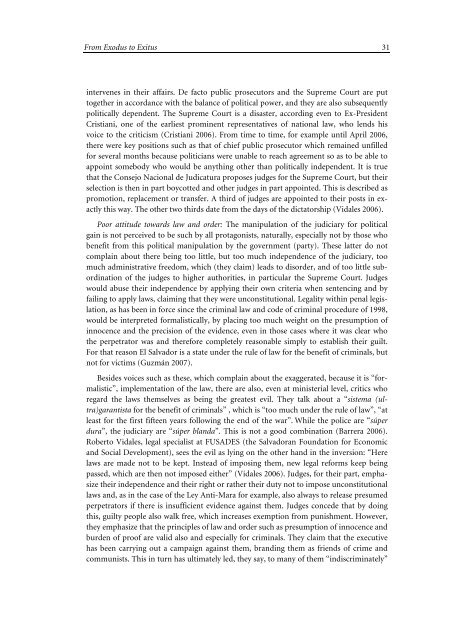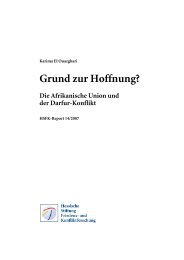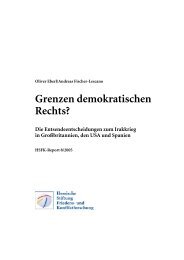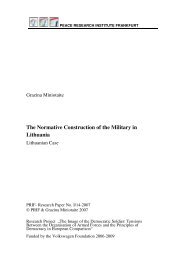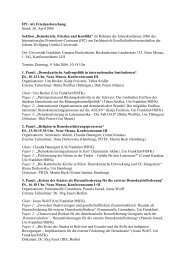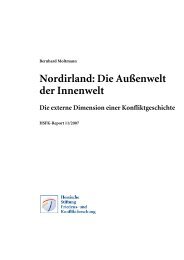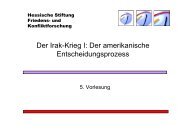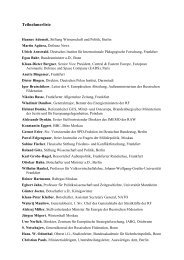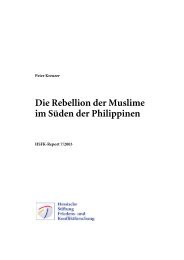From Exodus to Exitus Causes of post-war violence in El ... - eDoc
From Exodus to Exitus Causes of post-war violence in El ... - eDoc
From Exodus to Exitus Causes of post-war violence in El ... - eDoc
Create successful ePaper yourself
Turn your PDF publications into a flip-book with our unique Google optimized e-Paper software.
<strong>From</strong> <strong>Exodus</strong> <strong>to</strong> <strong>Exitus</strong> 31<br />
<strong>in</strong>tervenes <strong>in</strong> their affairs. De fac<strong>to</strong> public prosecu<strong>to</strong>rs and the Supreme Court are put<br />
<strong>to</strong>gether <strong>in</strong> accordance with the balance <strong>of</strong> political power, and they are also subsequently<br />
politically dependent. The Supreme Court is a disaster, accord<strong>in</strong>g even <strong>to</strong> Ex-President<br />
Cristiani, one <strong>of</strong> the earliest prom<strong>in</strong>ent representatives <strong>of</strong> national law, who lends his<br />
voice <strong>to</strong> the criticism (Cristiani 2006). <strong>From</strong> time <strong>to</strong> time, for example until April 2006,<br />
there were key positions such as that <strong>of</strong> chief public prosecu<strong>to</strong>r which rema<strong>in</strong>ed unfilled<br />
for several months because politicians were unable <strong>to</strong> reach agreement so as <strong>to</strong> be able <strong>to</strong><br />
appo<strong>in</strong>t somebody who would be anyth<strong>in</strong>g other than politically <strong>in</strong>dependent. It is true<br />
that the Consejo Nacional de Judicatura proposes judges for the Supreme Court, but their<br />
selection is then <strong>in</strong> part boycotted and other judges <strong>in</strong> part appo<strong>in</strong>ted. This is described as<br />
promotion, replacement or transfer. A third <strong>of</strong> judges are appo<strong>in</strong>ted <strong>to</strong> their <strong>post</strong>s <strong>in</strong> exactly<br />
this way. The other two thirds date from the days <strong>of</strong> the dicta<strong>to</strong>rship (Vidales 2006).<br />
Poor attitude <strong>to</strong><strong>war</strong>ds law and order: The manipulation <strong>of</strong> the judiciary for political<br />
ga<strong>in</strong> is not perceived <strong>to</strong> be such by all protagonists, naturally, especially not by those who<br />
benefit from this political manipulation by the government (party). These latter do not<br />
compla<strong>in</strong> about there be<strong>in</strong>g <strong>to</strong>o little, but <strong>to</strong>o much <strong>in</strong>dependence <strong>of</strong> the judiciary, <strong>to</strong>o<br />
much adm<strong>in</strong>istrative freedom, which (they claim) leads <strong>to</strong> disorder, and <strong>of</strong> <strong>to</strong>o little subord<strong>in</strong>ation<br />
<strong>of</strong> the judges <strong>to</strong> higher authorities, <strong>in</strong> particular the Supreme Court. Judges<br />
would abuse their <strong>in</strong>dependence by apply<strong>in</strong>g their own criteria when sentenc<strong>in</strong>g and by<br />
fail<strong>in</strong>g <strong>to</strong> apply laws, claim<strong>in</strong>g that they were unconstitutional. Legality with<strong>in</strong> penal legislation,<br />
as has been <strong>in</strong> force s<strong>in</strong>ce the crim<strong>in</strong>al law and code <strong>of</strong> crim<strong>in</strong>al procedure <strong>of</strong> 1998,<br />
would be <strong>in</strong>terpreted formalistically, by plac<strong>in</strong>g <strong>to</strong>o much weight on the presumption <strong>of</strong><br />
<strong>in</strong>nocence and the precision <strong>of</strong> the evidence, even <strong>in</strong> those cases where it was clear who<br />
the perpetra<strong>to</strong>r was and therefore completely reasonable simply <strong>to</strong> establish their guilt.<br />
For that reason <strong>El</strong> Salvador is a state under the rule <strong>of</strong> law for the benefit <strong>of</strong> crim<strong>in</strong>als, but<br />
not for victims (Guzmán 2007).<br />
Besides voices such as these, which compla<strong>in</strong> about the exaggerated, because it is “formalistic”,<br />
implementation <strong>of</strong> the law, there are also, even at m<strong>in</strong>isterial level, critics who<br />
regard the laws themselves as be<strong>in</strong>g the greatest evil. They talk about a “sistema (ultra)garantista<br />
for the benefit <strong>of</strong> crim<strong>in</strong>als” , which is “<strong>to</strong>o much under the rule <strong>of</strong> law”, “at<br />
least for the first fifteen years follow<strong>in</strong>g the end <strong>of</strong> the <strong>war</strong>”. While the police are “súper<br />
dura”, the judiciary are “súper blanda”. This is not a good comb<strong>in</strong>ation (Barrera 2006).<br />
Rober<strong>to</strong> Vidales, legal specialist at FUSADES (the Salvadoran Foundation for Economic<br />
and Social Development), sees the evil as ly<strong>in</strong>g on the other hand <strong>in</strong> the <strong>in</strong>version: “Here<br />
laws are made not <strong>to</strong> be kept. Instead <strong>of</strong> impos<strong>in</strong>g them, new legal reforms keep be<strong>in</strong>g<br />
passed, which are then not imposed either” (Vidales 2006). Judges, for their part, emphasize<br />
their <strong>in</strong>dependence and their right or rather their duty not <strong>to</strong> impose unconstitutional<br />
laws and, as <strong>in</strong> the case <strong>of</strong> the Ley Anti-Mara for example, also always <strong>to</strong> release presumed<br />
perpetra<strong>to</strong>rs if there is <strong>in</strong>sufficient evidence aga<strong>in</strong>st them. Judges concede that by do<strong>in</strong>g<br />
this, guilty people also walk free, which <strong>in</strong>creases exemption from punishment. However,<br />
they emphasize that the pr<strong>in</strong>ciples <strong>of</strong> law and order such as presumption <strong>of</strong> <strong>in</strong>nocence and<br />
burden <strong>of</strong> pro<strong>of</strong> are valid also and especially for crim<strong>in</strong>als. They claim that the executive<br />
has been carry<strong>in</strong>g out a campaign aga<strong>in</strong>st them, brand<strong>in</strong>g them as friends <strong>of</strong> crime and<br />
communists. This <strong>in</strong> turn has ultimately led, they say, <strong>to</strong> many <strong>of</strong> them “<strong>in</strong>discrim<strong>in</strong>ately”


